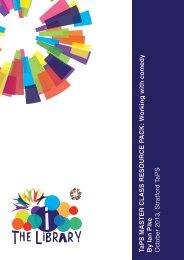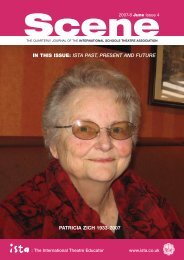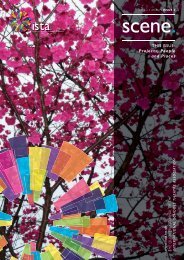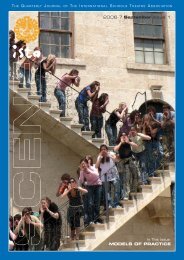ISTA/Scene March 07
ISTA/Scene March 07
ISTA/Scene March 07
Create successful ePaper yourself
Turn your PDF publications into a flip-book with our unique Google optimized e-Paper software.
Alenka Dorrell - American<br />
International School Budapest,<br />
Hungary<br />
Kabuki MACBETH: three <strong>Scene</strong>s<br />
from Shakespeare<br />
As part of a final directing unit, three IB<br />
student directors tackled the Prophecy,<br />
the Letter and the Final Battle in<br />
Kabuki style. Each student actor also<br />
took on a production role. The results<br />
were spectacular and the learning<br />
curve immense for everyone. The play<br />
lent itself well to the style. Our witches<br />
created some very Kabuki special<br />
effects (fishing lights in their teeth,<br />
cobwebs sprayed from their sleeves),<br />
the kata for the warriors and the<br />
extremely bloody fights with convenient<br />
mie to underscore the action (and<br />
allow everyone to breathe!) gave the<br />
choreographers a job while the<br />
designers worked with Kabuki colour<br />
symbolism for the Hanamichi floor<br />
cloths and the wall hangings. There<br />
was space for the musicians to<br />
compose a drumming and flute score<br />
and our narrator spoke the text in<br />
Japanese and English!<br />
THE GRADUATING CLASS by the<br />
High School Theatre Ensemble of<br />
AISB<br />
This was a devised production. We set<br />
it in an International School,<br />
improvising with characters from<br />
different walks of life/circumstances.<br />
The basic premise was a student<br />
thinking on the questions posed by her<br />
headmaster at Graduation, ‘Where<br />
have you come from Where are you<br />
going’ After every rehearsal, I took<br />
away the notes I had written from the<br />
students’ improvs and wrote the script<br />
that way. This is obviously going to be<br />
a touch frustrating in terms of writing<br />
because often you would rather the<br />
story was different (!) but it is a great<br />
way to teach devising and character;<br />
and to give the kids ensemble<br />
ownership of their piece. It was also<br />
hugely popular with the audience<br />
because they recognized so much<br />
from it – though we tried hard not to<br />
tell any personal stories.<br />
THREE SISTERS: an adaptation<br />
based on the play by Anton<br />
Chekhov<br />
My IB Seniors are exploring Naturalism<br />
through site-specific and Promenade<br />
theatre, by rehearsing and performing<br />
in my house. The first two acts take<br />
place in the living room, the third act is<br />
in the basement and fourth act takes<br />
Calderdale HS<br />
place in the garden! I can report that<br />
we are having a ball doing this piece.<br />
Working within a domestic environment<br />
has been fantastic. So many moments<br />
happen differently. A stage rehearsal<br />
for instance, had Vershinin walking<br />
around when talking. In the living room,<br />
this was clearly ‘unnatural’ so we<br />
made it much more static but used<br />
hands and faces more. In terms of<br />
production too it has been fascinating.<br />
Mood music doesn’t work at home,<br />
but you can do all sorts of things with<br />
stage lighting. Our performance is, for<br />
instance at 6pm but the first act is<br />
daytime, spring. We are placing large<br />
lights outside windows to shine in and<br />
give the conceit. Because it is cold<br />
here, torches and fire heaters are part<br />
of the 4th act (now set at night...)<br />
Interestingly, the 3rd act, in the<br />
smallest space, works the best of all.<br />
Anne Marie Drodz – Bilkent<br />
University Preparatory School,<br />
Turkey<br />
ANTIGONE by Jean Anouillh<br />
adapted by Anne Marie<br />
Grade 12 IB Theatre Arts students<br />
gained an experience of performing<br />
this play in a professional small studio<br />
theatre in February 2006. The play was<br />
adapted to suit the individual needs of<br />
7 students. They were given enough<br />
individual exposure but were not<br />
overburdened with large chunks of text<br />
to memorize. The essence of the play<br />
was kept intact – maintaining themes<br />
of oppression, teenage rebellion and<br />
search for identity. Drawing on Greek<br />
myths and the theatrical conventions of<br />
Greek Theatre, (masks, ritual dance<br />
and choral movement), we also used<br />
rehearsal techniques drawn from<br />
Boal’s “Theatre of the Oppressed”<br />
which was later incorporated into the<br />
fabric of the play, eg, Colombian<br />
Hypnosis, Mirroring, Image Sculpturing<br />
etc. This was interlaced with modern<br />
music and modern references in terms<br />
of props and costuming. The set<br />
design owed much to the influence of<br />
Peter Brook with a minimalist approach<br />
and an “empty space” feel to the<br />
piece. The 7 actors gained a<br />
worthwhile experience of performing in<br />
a professional theatre space and<br />
gained a synthesis of the two year<br />
journey they had taken from Greek<br />
Theatre in Year 1 through to Theatre of<br />
the Oppressed in Year 2.<br />
THE DINING ROOM by A.R. Gurney<br />
The Grade 11 IB Theatre Arts class<br />
performed this American classic in May<br />
of 2006. Each of the six actors played<br />
six to eight characters in the course of<br />
the two-act play. As the director, I was<br />
thrilled to finally have the numbers and<br />
talent to put this piece on the stage.<br />
This was also the first time at<br />
BUPS/BIS that students performed a<br />
full length dramatic piece, another sign<br />
of how our theatre department is<br />
expanding. The structure of the script<br />
made every student stretch themselves<br />
to reach the ultimate challenge faced<br />
by every actor: How does one create a<br />
believable character onstage They<br />
had to exit, unbutton a shirt or pin up<br />
their hair and come back on stage as<br />
another character entirely. Due to<br />
scheduling restrictions, the IB students<br />
worked on the piece for over three<br />
months before it went up, requiring<br />
them to sustain focus and commitment<br />
on a much higher scale. The main<br />
challenge of the piece, technically, was<br />
the set and props. The dining room in<br />
question had to be stereotypically<br />
American WASP, yet versatile enough<br />
that it could withstand the 11 scenes<br />
played around it. Students learned the<br />
incredible frustrations every prop<br />
master goes through: how to find not<br />
just a spoon, but a whole set that not<br />
only matches each other but the<br />
<strong>Scene</strong> | 2006-7 <strong>March</strong> Issue 3 | 5

















